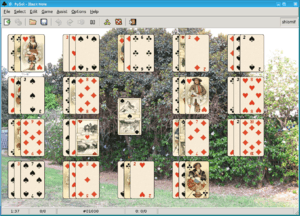Black Hole (solitaire)
Black Hole is a patience or solitaire card game with game-play similar to Golf and Tri Peaks, but with a tableau of fans similar to La Belle Lucie. Invented by David Parlett, this game's objective is to compile the entire deck into one foundation.[1]

Rules
The cards are dealt to the tableau in piles of three. The leftover card, dealt first or last, is placed as a single foundation called the Black Hole. This card usually is the Ace of Spades, but any card can do.
Only the top cards of each pile in the tableau are available for play and in order for a card to be placed in the Black Hole, it must be a rank higher or lower than the top card on the Black Hole, ignoring suit. This is the only allowable move in the entire game. Aces and Kings are considered consecutive, thus allowing wrapping.[2]
The game ends if there are no more top cards that can be moved to the Black Hole. The game is won if all of the cards end up in the Black Hole.
Solvability and Complexity
Shlomi Fish wrote a program which attempted to solve one million deals, of which 869,413 could be solved and the 130,587 others were fully traversed without a possible final solution. [3]
A generalised version of the Black Hole patience is NP-complete.[4]
References
- Black Hole Solitaire Rules, Solitaire Forever.
- Rules of Black Hole, Thomas Warfield, Goodsol.com.
- Shlomi Fish, Solving Statistics for the First 1 Million PySolFC Black Hole Solitaire Deals, 11 September 2010. According to Schlomi, the search iterations counts of both the solved and unsolved deals had fairly large averages (roughly 292,400 and 553,884) and standard deviations which indicates that some deals result in many false ends, while the median number of iterations for the solved states was also relatively high (roughly 79,000).
- Gent, I.P., Jefferson, C., Kelsey, T., Lynce, I., Miguel, I., Nightingale, P., Smith, B.M. and Tarim, S.A. (2007) "Search in the Patience Game `Black Hole'", AI Communications - Constraint Programming for Planning and Scheduling archive Volume 20 Issue 3, Pages 211-226
Similar Games
- All in a Row - played with 13 columns of 4-cards each, and at the start of play, the first move can be made from any column.
